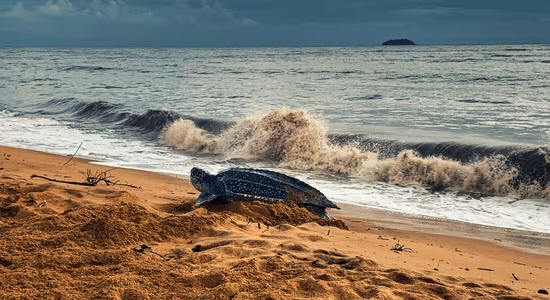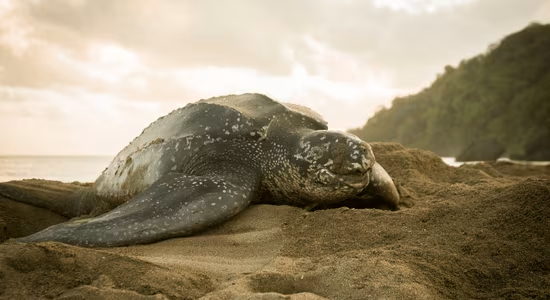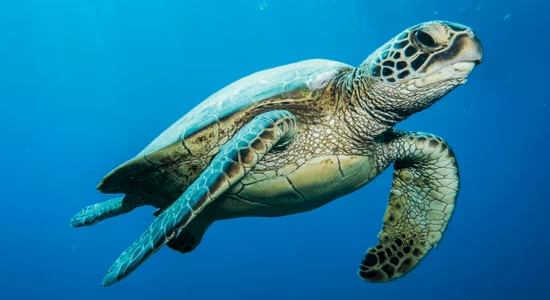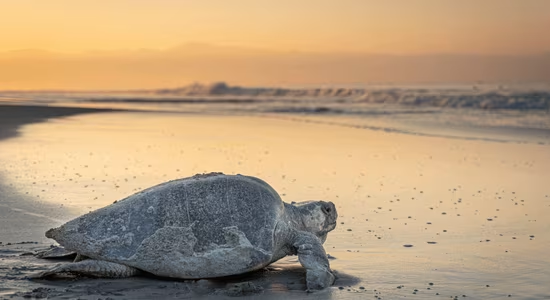Discover the leatherback turtles of French Guiana with Europcar.
Enjoy a unique moment and observe leatherback turtles in French Guiana with Europcar
The beaches of French Guiana are famous in the world to observe marine turtles, especially the leatherback turtle, a species that can reach up to 500kg. Each year, the west of the department welcomes up to 20,000 leatherback turtle clutches and 6,500 in the east.

© Credit source: canva
Where to observe turtles in French Guiana ?
It is easy to observe turtles generally in the western and eastern side of French Guiana. There are mainly two nesting beaches:
one in the West : with the beach of Hattes in Awala-Yalimapo, where we observe mainly green turtles,
one in the East : with the beach of Montjoly in Rémire-Montjoly where olive ridley turtles are mainly observed.
There are also several secondary beaches where turtles can be observed such as the beach :
of Farez
of Aztec
of Rizières
of Kourou
of Zephir
and finally Gosselin
When to observe turtles in French Guiana ?
In the past, French Guiana was known as the place where vacationers went to observe turtles. One of the best times to observe these magnificent creatures is between February and August, when they come to lay their eggs on the sandy coasts of the country.
During this period, you can join groups of hikers and experience a turtle watching climb. This is an unforgettable way to get up close and personal with turtles in all their complexity, while learning more about their habitat, conservation efforts and the importance of safeguarding their environment. The different periods of laying and emergence in the West :
the green turtle : it emerges from January to May, and lays eggs from March to June
the leatherback turtle : it emerges from May to September, and lays eggs from March to June.
The different periods of laying and emergence in the East :
the olive ridley turtle : it emerges from August to October, and lays from June to August
the leatherback turtle : it emerges from June to October, and lays from April to August
How to observe turtles in French Guiana ?
Watching turtles in their natural habitat is an incredible experience, but it is important to do it with respect and safety.
Visitors need to keep their distance to minimize any disturbance when viewing these creatures. They also need to move slowly, quietly, and avoid the use of flashbulbs and limit the size of groups. Local guides will have additional advice and can help provide a safe environment for the turtles while providing you with an unforgettable experience. Several things to do :
If you have a pet, such as a dog, it is necessary to keep it on a leash so as not to scare the turtles
It is necessary to keep a good distance from the turtles out of their field of vision, especially during the laying of eggs, so as not to hinder them in their progression towards the sea
When laying eggs, stand several meters behind the turtle calmly and silently
Do not illuminate the turtles with lamps or phone flashes, and rather position yourself behind the turtle
Do not throw your packaging or waste on the beach, it can be harmful or deadly for the turtles
And finally, do not touch the turtles or their eggs
Let the new-born turtles progress at their own pace. To want to accelerate their progression can generate their death
Thanks to the Kwata association, several playful animations, especially for the youngest, are organized to meet the turtles, to admire them, but also to raise awareness about their conservation.
What are the different species of turtles in French Guiana?
There are three species that are born and come to lay their eggs each year in French Guiana: the leatherback turtle, the green turtle and the olive ridley turtle. Each species is uniquely adapted to live in a habitat found along the coast or waterways.
They all play an important role in our environment as they are part of the food web and help to expand genetic diversity within their own species through migration between habitats.
Species conservation efforts around the world must protect these valuable turtle to ensure diverse and healthy ecosystems in the future.
The leatherback turtle, the emblematic species of Guyana
Reputed to be an oceanic species, but also feeding in coastal areas, it is present in all seas and oceans, whether temperate, tropical or sub-polar. It is the biggest marine turtle, being able to reach 400 kg and to exceed the two meters length. Unlike the others, its shell is not covered with scales but with a tough skin. It generally feeds on jellyfish and other gelatinous plankton.

© Credit source: canva
The green turtle
With an average weight of 180 kg and a length of about 1 meter, it is the largest of the marine turtles with scales. Its carapace is brown, gray or green, which gives it its name. It is widely spread in the seas and oceans of the world whose waters exceed 20°C. Carnivorous at the beginning of their life, they feed mainly on zooplankton, jellyfish, sea anemones, sponges, shrimps, fish. Then they become more herbivorous at the sub-adult stage, to become almost exclusively herbivorous at adulthood, by feeding on underwater herbariums and algalaria.

© Credit source: canva
The olive ridley turtle
With an average weight of 40 kg and a size of 70 centimeters, it is the smallest marine turtle. It owes its name to the olive green to brown ochre color of its carapace. It is present in all tropical oceans. They feed mainly on jellyfish, mollusks, crustaceans, sea urchins or fish and marine plants.

© Credit source: canva
Visit French Guiana with a rental car
French Guiana is a perfect destination for nature lovers. It is a small corner of paradise where you will have the opportunity to discover an incredible natural wealth. Take off in your rental car with Europcar Guiana and explore the turtles of Guiana now!
Do you like animals? You'll love our article dedicated to visiting the zoo in Guyana. Home to many exotic species of wild animals, the Guyana Zoo is a must-see when visiting the country!

Subscribe to our newsletter
Subscribe to our newsletter and receive our best offers of the moment exclusively


Tripadvisor

Travel award

Kayak
@Europcar French Guiana
